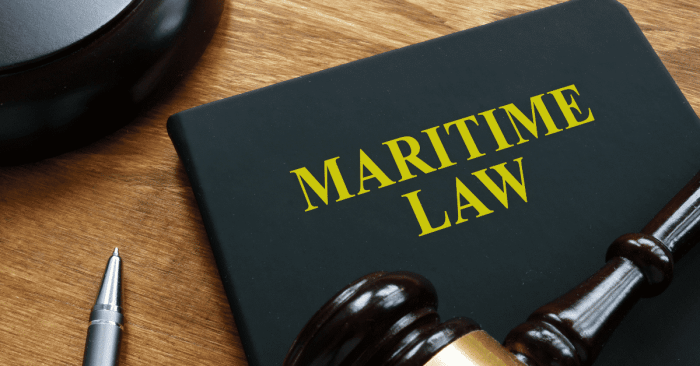Embark on a journey delving into the intricate world of Maritime Law, where the seas are governed by a unique set of rules and regulations that shape global maritime activities. From defining maritime law to unraveling its historical roots, this overview sets the stage for a captivating exploration of this fascinating legal domain.
As we navigate through the depths of international maritime law, admiralty law, cabotage laws, environmental regulations, and more, we discover the complexities and nuances that define this vital area of legal expertise.
Overview of Maritime Law
Maritime law, also known as admiralty law, is a body of laws, conventions, and treaties that governs activities and issues related to the sea. It covers a wide range of matters, including shipping, navigation, marine pollution, salvage, and more.
Historical Development of Maritime Law
The roots of maritime law can be traced back to ancient civilizations such as the Greeks and Romans, who established basic maritime customs and regulations. Over time, maritime law evolved to meet the changing needs of seafarers and traders, with influential legal codes like the Rhodian Laws and the Laws of Oleron shaping its development.
Importance of Maritime Law
Maritime law plays a crucial role in regulating international trade, ensuring the safety of vessels and crew members, and protecting the marine environment. By providing a framework for resolving disputes and enforcing rights and obligations, maritime law promotes order and stability in the global maritime industry.
International Maritime Law
International Maritime Law is governed by key international conventions that aim to regulate various aspects of maritime activities on a global scale. These conventions play a crucial role in ensuring uniformity and consistency in maritime regulations across different countries.
Key International Conventions
- The United Nations Convention on the Law of the Sea (UNCLOS): This convention establishes the legal framework for all activities in the oceans and seas, including navigation, environmental protection, and resource management.
- International Convention for the Safety of Life at Sea (SOLAS): SOLAS sets minimum safety standards for ships, covering areas such as construction, equipment, and operation to ensure the safety of life at sea.
- International Convention on Maritime Search and Rescue (SAR): This convention establishes procedures for coordinating search and rescue operations at sea to save lives and provide assistance to those in distress.
Jurisdictional Issues in International Waters
In international waters, jurisdictional issues can be complex due to the absence of a single governing authority. Countries must often rely on international agreements and conventions to determine jurisdiction over various matters such as maritime accidents, pollution incidents, and illegal activities at sea.
The principle of freedom of navigation is crucial in ensuring the peaceful use of international waters by all states.
Role of Organizations like the IMO
The International Maritime Organization (IMO) plays a significant role in shaping international maritime law by developing and implementing regulations that promote safety, security, and environmental protection in the shipping industry. Through conventions and guidelines, the IMO works to harmonize maritime practices and standards globally, facilitating cooperation among member states to address common challenges and issues in the maritime domain.
Admiralty Law
Admiralty law, also known as maritime law, is a distinct body of law that governs maritime disputes, accidents, and activities on navigable waters. It deals with issues such as shipping, navigation, salvage, and maritime commerce. Admiralty law is closely related to maritime law, with maritime law encompassing a broader scope of regulations and conventions that govern activities on the sea.
Principles of Admiralty Law
- Admiralty law is based on the principle of equity and fairness, seeking to provide remedies for parties involved in maritime disputes.
- The law recognizes the unique nature of maritime activities and the need for specialized rules to address the complexities of maritime commerce.
- Admiralty law applies the concept of “general average,” where all parties involved in a maritime adventure share the losses equally, promoting cooperation and risk-sharing among shipowners, cargo owners, and other stakeholders.
Famous Admiralty Cases
- The Titanic Disaster: The sinking of the RMS Titanic in 1912 led to significant changes in maritime safety regulations, including the implementation of stricter safety measures and the establishment of the International Ice Patrol to prevent similar accidents.
- The Exxon Valdez Oil Spill: The Exxon Valdez oil tanker spill in 1989 off the coast of Alaska resulted in one of the largest environmental disasters in history, leading to extensive legal battles and the enactment of stricter regulations on oil transportation and spill prevention.
- The Deepwater Horizon Oil Spill: The Deepwater Horizon oil rig explosion in 2010 in the Gulf of Mexico caused a massive oil spill, resulting in extensive environmental damage and legal disputes over liability and compensation for affected parties.
Cabotage Laws
Cabotage laws refer to regulations that govern the transportation of goods or passengers between two points within the same country by a vessel registered in that country. These laws are crucial in protecting the national maritime industry and ensuring the safety and security of domestic shipping operations.
Comparison of Cabotage Laws
- United States: The Jones Act is a well-known cabotage law in the U.S., requiring all goods transported between U.S. ports to be carried on vessels that are built, owned, and operated by U.S. citizens or permanent residents.
- Canada: The Coasting Trade Act regulates cabotage in Canada, limiting foreign vessels from engaging in domestic shipping activities.
- Australia: The Coastal Trading Act governs cabotage in Australia, promoting the use of Australian-flagged vessels for coastal shipping.
Economic Implications of Cabotage Regulations
Cabotage laws can have both positive and negative effects on the maritime industry and the economy as a whole.
- Protection of Domestic Industry: Cabotage laws help protect the domestic maritime industry from foreign competition, ensuring that local companies have a competitive advantage.
- Increased Costs: However, these regulations can also lead to increased costs for consumers due to limited competition and potentially higher shipping rates.
- Job Creation: By promoting the use of domestic vessels, cabotage laws can also stimulate job creation in the maritime sector, contributing to the local economy.
Pollution and Environmental Laws
Maritime activities can have a significant impact on the environment, leading to pollution and affecting marine ecosystems. In order to regulate and mitigate these effects, there are specific environmental laws governing maritime operations.
Environmental Regulations for Maritime Activities
When it comes to maritime activities, there are stringent environmental regulations in place to ensure the protection of marine ecosystems. These regulations cover areas such as wastewater discharges, air emissions, and the disposal of hazardous materials.
Impact of Pollution on Marine Ecosystems
- Oil spills can have devastating effects on marine life, causing harm to wildlife and disrupting ecosystems.
- Chemical pollution from ships can contaminate water bodies, affecting the health of marine organisms.
- Plastic pollution is a major concern in oceans, posing a threat to marine animals through ingestion and entanglement.
Legal Framework to Address Pollution
- International conventions such as MARPOL (International Convention for the Prevention of Pollution from Ships) set standards for pollution prevention and establish liability for violations.
- National laws in various countries also impose fines and penalties on shipowners and operators for pollution incidents.
- The concept of strict liability holds shipowners responsible for pollution damage regardless of fault, emphasizing the importance of prevention measures.
Maritime Insurance
Maritime insurance plays a crucial role in the shipping industry by providing protection against potential risks and liabilities that can arise during maritime activities. It offers financial security to shipowners, cargo owners, and other stakeholders involved in the maritime sector.
Types of Maritime Insurance
- Hull Insurance: Covers damage to the vessel itself, including collisions, sinking, and other accidents.
- Cargo Insurance: Protects the goods being transported against loss, damage, or theft during transit.
- Protection and Indemnity (P&I) Insurance: Provides liability coverage for third-party claims related to injury, pollution, or damage caused by the vessel.
Recent Trends in Maritime Insurance
- Increased Digitization: The use of technology in underwriting, claims processing, and risk assessment is becoming more prevalent, leading to greater efficiency in the insurance process.
- Rising Cyber Risks: With the increasing reliance on digital systems in the maritime industry, cyber insurance coverage has become more important to protect against cyber threats and data breaches.
- Sustainability Initiatives: Insurers are incorporating environmental considerations into their policies, offering coverage for green initiatives and compliance with environmental regulations.
Ship Registration and Flags of Convenience
Ship registration is the process by which a ship is documented in a particular country, allowing it to fly that country’s flag. The flag a vessel flies, also known as its flag state, determines the laws and regulations that govern the ship and its operations.
Flags of convenience refer to the practice of registering a ship in a country other than the owner’s country of origin, typically to take advantage of more lenient regulations, lower taxes, and cheaper labor costs. This practice has significant implications for maritime law and the industry as a whole.
Legal Implications of Flags of Convenience
- Ships registered under flags of convenience may not be subject to stringent safety, labor, or environmental regulations, leading to potential risks for crew members, passengers, and the marine environment.
- Flag states have the primary responsibility for enforcing maritime regulations and ensuring compliance with international standards. However, flags of convenience can make it challenging to hold shipowners and operators accountable for violations.
- Operating under a flag of convenience can also complicate legal proceedings in cases of accidents, pollution incidents, or disputes, as the jurisdiction and applicable laws may be unclear or disputed.
- Some argue that flags of convenience contribute to a race to the bottom in terms of safety, labor conditions, and environmental protection, as shipowners seek to cut costs and maximize profits by registering their vessels in countries with lax regulations.
Maritime Labor Laws
Maritime labor laws govern the rights and regulations for seafarers working on ships. These laws aim to protect the rights and ensure the safety of maritime workers who often face challenging and hazardous working conditions at sea.
Challenges Faced by Maritime Workers
- Long working hours and extended periods away from home and family.
- Risk of accidents and injuries while on duty.
- Lack of access to proper healthcare and medical facilities while at sea.
- Issues related to fair wages, working conditions, and job security.
Legal Protections for Maritime Workers
- The Maritime Labor Convention (MLC), also known as the “Seafarers’ Bill of Rights,” sets out minimum working and living standards for seafarers on board ships.
- Seafarers have the right to a safe working environment, decent living conditions, and access to medical care.
- Maritime workers are entitled to fair wages, repatriation, and compensation in case of injury or illness.
Role of International Organizations
- The International Labour Organization (ILO) plays a key role in setting international labor standards for seafarers through conventions and recommendations.
- The International Maritime Organization (IMO) works to ensure the enforcement of these standards and promotes the welfare of maritime workers globally.
- International organizations collaborate with governments, shipowners, and seafarers’ unions to address labor issues and improve working conditions in the maritime industry.
Salvage and Towage

Salvage and towage are essential aspects of maritime law that deal with the recovery of ships or cargo in distress and the towing of vessels for various purposes.
Salvage Operations
Salvage in maritime law refers to the act of rescuing a ship or its cargo from danger at sea. Salvors who successfully carry out salvage operations are entitled to a reward known as salvage award. The legal principles governing salvage operations include the duty to render assistance to vessels in distress, the concept of marine peril, and the requirement of voluntary actions.
- Salvage operations must be carried out in good faith and with reasonable skill and diligence.
- The amount of salvage award is determined based on various factors, including the value of the property salved, the degree of danger involved, and the skill and efforts of the salvors.
- Landmark salvage cases such as The Resolute and The Flying Enterprise have helped shape the legal framework for salvage operations and the determination of salvage awards.
Towage Agreements
Towage involves the towing of vessels by tugboats for various purposes, such as assistance in docking, maneuvering in narrow channels, or salvage operations. Towage agreements set out the terms and conditions under which the tugboat will provide its services to the towed vessel.
These agreements typically include provisions related to the payment of towage fees, the responsibilities of the parties involved, and the liability for any damages that may occur during the towage operation.
- Towage agreements are governed by contract law principles, and any disputes arising from these agreements are usually resolved through arbitration.
- Examples of landmark towage cases include The Smit Rotterdam and The Wadi Sudr, which have established important legal precedents in the field of towage agreements.
Navigation and Collision Regulations
Navigation and collision regulations are crucial in ensuring the safety of vessels at sea. These rules govern how ships should maneuver and interact with each other to prevent accidents and minimize risks.
Rules Governing Navigation at Sea
- Ships must follow established traffic lanes and signals to avoid collisions.
- Speed limits are enforced to ensure safe navigation, especially in congested areas.
- Proper lookout procedures must be maintained at all times to spot potential hazards.
- Navigation lights and sound signals are used to communicate with other vessels, especially in low visibility conditions.
Legal Principles Surrounding Collisions
- In case of a collision, the principle of ‘lookout’, ‘safe speed’, ‘risk of collision’, and ‘taking action to avoid collision’ are considered to determine liability.
- The International Regulations for Preventing Collisions at Sea (COLREGs) provide a framework for avoiding collisions and assigning fault in case of accidents.
- The burden of proof lies on the vessel that fails to adhere to the established rules and regulations.
Liability and Legal Consequences of Maritime Collisions
- Liability for maritime collisions can lead to legal actions, including compensation claims for damages, injuries, and loss of life.
- The concept of ‘privity and knowledge’ may be used to determine the liability of the shipowner in collision cases.
- Insurance coverage plays a significant role in covering the costs associated with collisions and protecting the interests of the parties involved.
Maritime Dispute Resolution
Maritime disputes are a common occurrence in the shipping industry, and resolving them efficiently is crucial to maintaining smooth operations and relationships. Various methods of dispute resolution exist in maritime law, each with its own advantages and disadvantages.
Arbitration
Arbitration is a popular method of resolving maritime disputes, often chosen for its confidentiality and flexibility. Parties involved can select arbitrators with expertise in maritime law, ensuring a fair and knowledgeable decision-making process. However, arbitration can be costly and time-consuming.
Mediation
Mediation involves a neutral third party assisting the disputing parties in reaching a mutually acceptable solution. It is a more informal and cooperative process compared to arbitration or litigation, promoting communication and preserving relationships. However, the outcome of mediation is not legally binding, and parties may still end up in litigation if a resolution is not reached.
Litigation
Litigation is the traditional method of resolving disputes through the court system. While it provides a definitive and enforceable decision, litigation in maritime cases can be lengthy, expensive, and public. The complexities of maritime law can also make litigation a challenging process for all parties involved.
Comparative Analysis
- Arbitration: Provides confidentiality and expertise but can be costly.
- Mediation: Promotes communication and cooperation but lacks legal enforceability.
- Litigation: Offers a definitive decision but can be time-consuming and expensive.
Conclusion
In conclusion, Maritime Law stands as a cornerstone of global trade and commerce, ensuring order and accountability on the high seas. As we reflect on the diverse aspects covered in this discussion, it becomes evident that the realm of Maritime Law is as vast and dynamic as the oceans themselves, constantly evolving to address new challenges and opportunities.

